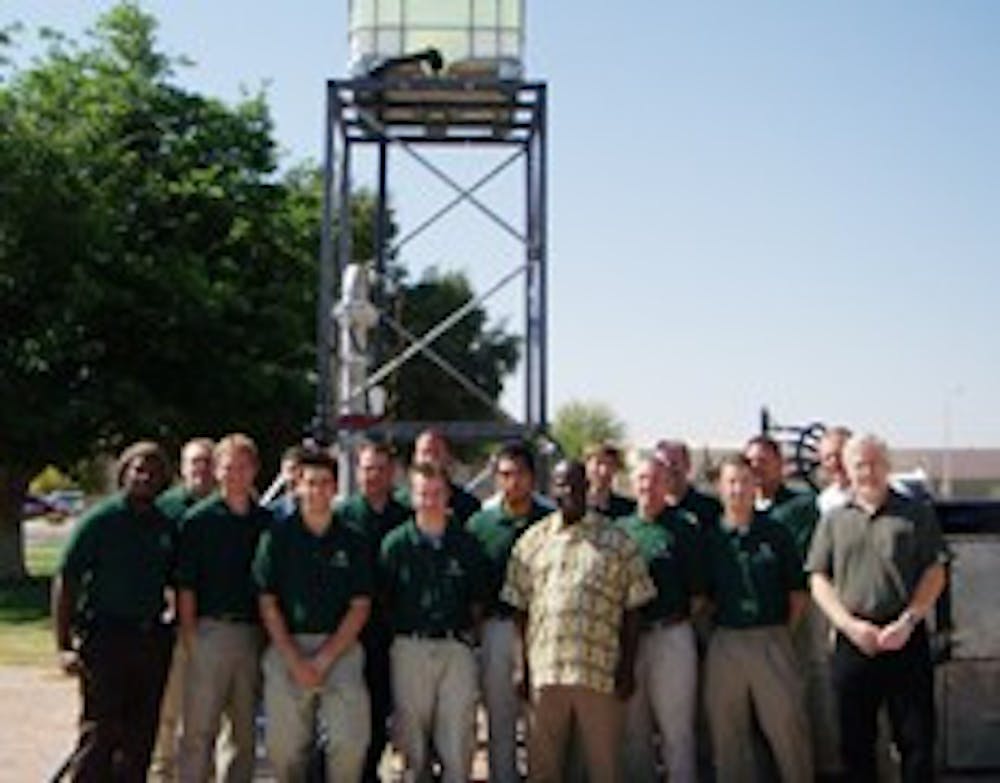When GlobalResolve, an ASU-affiliated initiative, traveled to the African country of Ghana in May 2007, the group came back with a challenge for students in the Polytechnic Mechanical and Manufacturing Engineering Technology, or MMET, program: Create a method for producing ethanol biofuel out of corn using only resources that would be readily available to Ghanaian villagers.
On Tuesday, less than one year later, MMET students Oliver Adair, Douglas Clark, Russell Davies, John (Tony) Garnett, Paul Harris, Matthew Hawk, Robin Hurt, Andrew Miles, Chanson Shells, Brian Smith, Jonathan Willis and Eric Wirth presented their technology to the paramount chief of the village of Domeabra, of the Ashante region, is located in the heart of Ghana.
GlobalResolve is a group that works to help solve problems facing rural and underprivileged people around the world through social entrepreneurship and empowerment, rather than through charity, said GlobalResolve co-director and ASU professor Mark Henderson.
Last year, GlobalResolve addressed some of the toughest issues facing Ghana, a country of about 22 million people.
As of right now, "Ghanaian people use coal and firewood as fuel in their stoves for cooking," said Dr. Brad Rogers, ASU professor and GlobalResolve participant. "This creates extreme levels of indoor air pollution"
According to the World Health Organization, upper-respiratory infections because of indoor air pollution are a major cause of death for children and women in Ghana.
"In Ghana, we are using charcoal and firewood from forests, which is not only a health problem, but in another 50 years, the forests will be depleted," said Chief Nana Frimpong Afoakwa, who came to the Polytechnic campus Tuesday morning to be presented with MMET's solution.
Afoakwa graduated from the Massachusetts Institute of Technology in 1975 with a degree in mechanical engineering and returned to Ghana to serve as paramount chief of Domeabra in 2003, after working as an engineer in New York for more than 25 years.
MMET's creation takes regular corn, and through a distillation and refining process, creates a gelled form of ethanol, which can then be used as an emissions-free fuel source.
"Not only does this technology remove the hazard, gelled ethanol is a commercial product, which can then be sold as an economically sustainable source of income for these villages," Rogers said.
Afoakwa agreed, "The growing and selling of the corn will create many jobs, a whole business for women who spend lots of time collecting firewood right now," he said.
MMET program coordinator Jerry Gintz said a single system, when run at maximum capacity, can produce up to 500,000 gallons of ethanol per year and that ethanol as fuel can be sold at a price of about $2 per gallon.
"This technology was completely designed and manufactured from scratch by our [MMET] students," Gintz said. "These students take complete ownership. They all dedicated at least 20 hours a week and many nights and weekends."
The team will be expanding their realm of experience even further this August when they travel to Ghana to help set up and teach the villagers how to run their new technology.
MMET students Douglas Clark and Tony Garnett agree that the project was time consuming, but the benefits far outweigh the costs.
"Before, there was no recipe, no directions we could find for this sort of technology — it's totally new," said Garnett, the team's official project manager.
"Turning corn into gelled ethanol is a chemical process," he said. For that, the group looked to team member Chanson Shells, who spent many hours in the chemistry lab consulting with Chandler-Gilbert chemistry professor Dr. Bradford Bates.
Reach the reporter at: kbielski@asu.edu.




